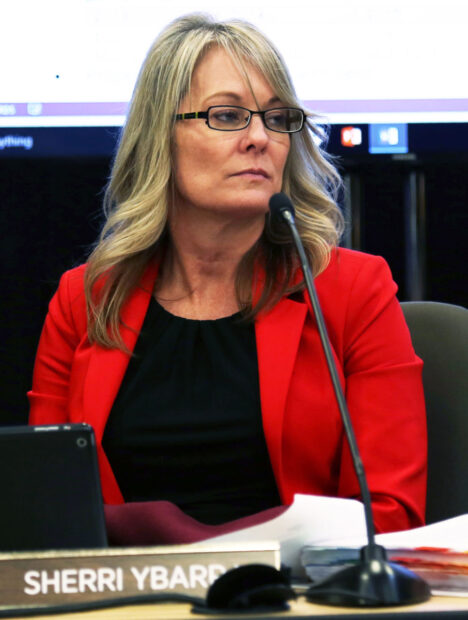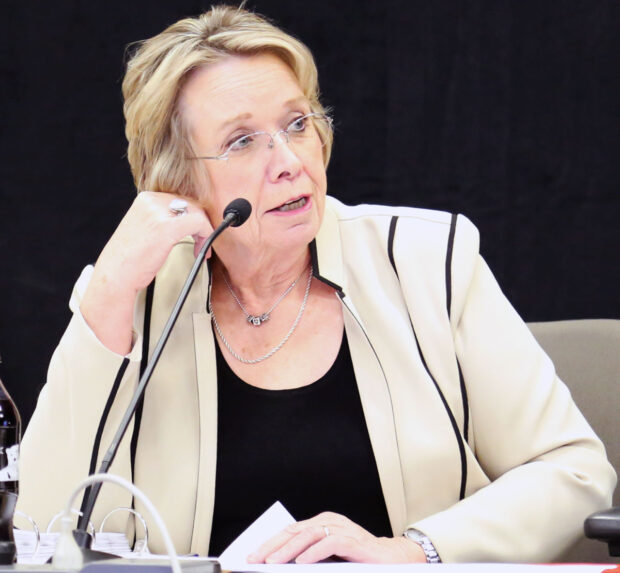NAMPA — The State Board of Education called in an independent mediator to help its members and Superintendent of Public Instruction Sherri Ybarra to iron out questions of responsibility and authority.
The two-hour meeting brought to light some of the confusion — and some of the tension — that had been simmering beneath the surface between Ybarra, the rest of the State Board and their respective staffs.

Legally speaking, Ybarra is a voting member of the State Board based on her elected position as state superintendent. Idaho’s governor appoints the other seven voting board members.
The mediation session culminated with a brief but tense clash between Ybarra and State Board President Emma Atchley before all sides expressed a desire to work together for students’ benefit.
After more than an hour of mediation, Ybarra began to assert the importance of her role in education policy. Ybarra said that a proposed school accountability system that both sides are working on will go nowhere without her signature of approval — even if the State Board approves it.
Ybarra also referred to herself as the “secretary of education” at least twice.
“You are the executive secretary of this board,” Atchley told Ybarra, raising her voice slightly. “You are not the secretary of education.”
In response, Ybarra said, “So why don’t we get into that?”
The facilitator, Terri DeNinni, took notice by this point and said, “It sounds like the whole meeting has kind of taken a different turn.”
After a brief back-and-forth, Atchley answered the question about authority, responsibility and accountability.
“It is important to recognize Sherri works with us,” Atchley said. “But the ultimate responsibility for education in this state rests with this board. The ultimate responsibility rests with this body, not with individuals.”

Ybarra said she heard Atchley “loud and clear,” telling her “I get it.” Ybarra also said she has been listening to so much national political news lately — an apparent explanation for why she mistakenly identified herself as secretary of education.
Earlier in the session, Ybarra said the discussion of roles and responsibilities was justified, since the lines are blurry.
“I think that’s why we are here,” Ybarra said. “Trying to figure out what’s wrong with the process.
“I think if we do not define these rules … this continues to come up,” Ybarra added.
As the session wound down, Ybarra blamed both agencies’ nonpartisan staffers for confusion over responsibilities and authority.
“I know them. We know them. I don’t know that staff knows them,” Ybarra said.
During interviews last month, Ybarra’s staff told Idaho Education News that Ybarra runs the 140-person State Department of Education as a support agency, not a compliance agency focused on accountability. Ybarra strives to support schools, not punish them, her staff emphasized.
Before the mediation session started, officials taped a large piece of paper to the wall listing ground rules. The rules called for Ybarra and the State Board to show mutual respect, to act tough on the issues only, to remain open-minded and not to engage in side conversations.
Originally, Ybarra, State Board Executive Director Matt Freeman and State Board members planned to address 25 different education topics, one at a time, spelling out in detail who is responsible for what.
Other State Board members urged Ybarra and Freeman to work this issue out among themselves and to only bring major disagreements or “high-level” issues before the board. Ybarra and Freeman agreed to work together, and report their progress to the State Board in February.
Before ending the mediation session, Ybarra said the meeting provided the clarity she sought.
The mediator congratulated everybody involved. Ybarra and Atchley then thanked each other for their service and dedication to schools.
Ybarra got in the last word. She told those in the audience that any perception that she and the State Board can’t agree, is straight up “political baloney.”
